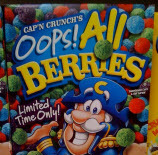Did PepsiCo Leave Cap'n Crunch Adrift At Sea?
A seafaring high commander of morning goodness for decades, Cap’n Crunch may now be walking the plank, because PepsiCo apparently hasn’t so much as put out a press release about the cereal since 2007.
Daily Finance speculates the cereal, which packs a timbers-shivering 12 grams of sugar per serving, may be getting thrown overboard because its sugar content runs counter to the company’s goal over the next decade to reduce added sugar per serving in products by 25 percent and saturated fat by 15 percent.
A rep from Yale’s Rudd Center for Food Policy & Obesity tells DailyFinance:
“Our research shows that PepsiCo is no longer marketing Cap’n Crunch cereal directly to children. In a sense, you could say that they have retired Cap’n Crunch, and that’s a good thing. Unfortunately, children continue to view hundreds of ads per year for high-sugar cereals from General Mills, Kellogg’s and Post Foods.”
Has the lack of marketing made you abandon the Cap’n? Consumerist talked to a rep for Quaker, the PepsiCo division responsible for the sugar cereal:
Quaker has a large and diverse product portfolio, which includes Cap’n Crunch — one of the most iconic brands in America, especially among adults who grew up eating this cereal. With such a broad portfolio, we need to focus our efforts and so in 2011, you will see increased communications on our flagship Quaker brands, in large part because they meet the continued consumer demand for healthier products.
However, we are pleased to report that our Cap’n Crunch brand will soon have an official social media presence, so adult consumers can stay up-to-date on all things Cap’n Crunch. While stepping up our digital presence, our plans for Cap’n Crunch will continue to meet our commitments to the Children’s Food and Beverage Advertising Initiative.
Cap’n Crunch sails into obscurity [Daily Finance via Life Inc.]
Want more consumer news? Visit our parent organization, Consumer Reports, for the latest on scams, recalls, and other consumer issues.


